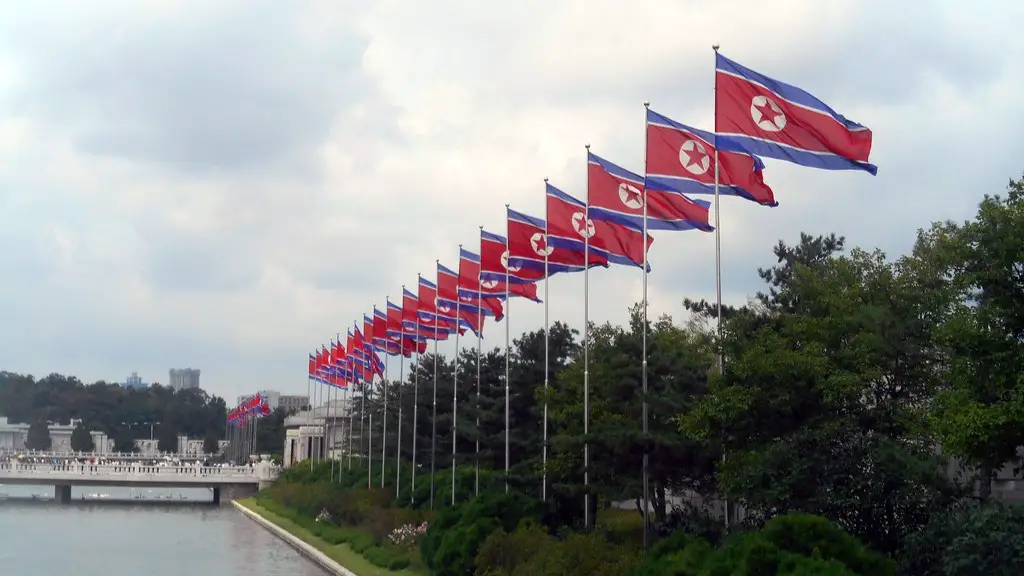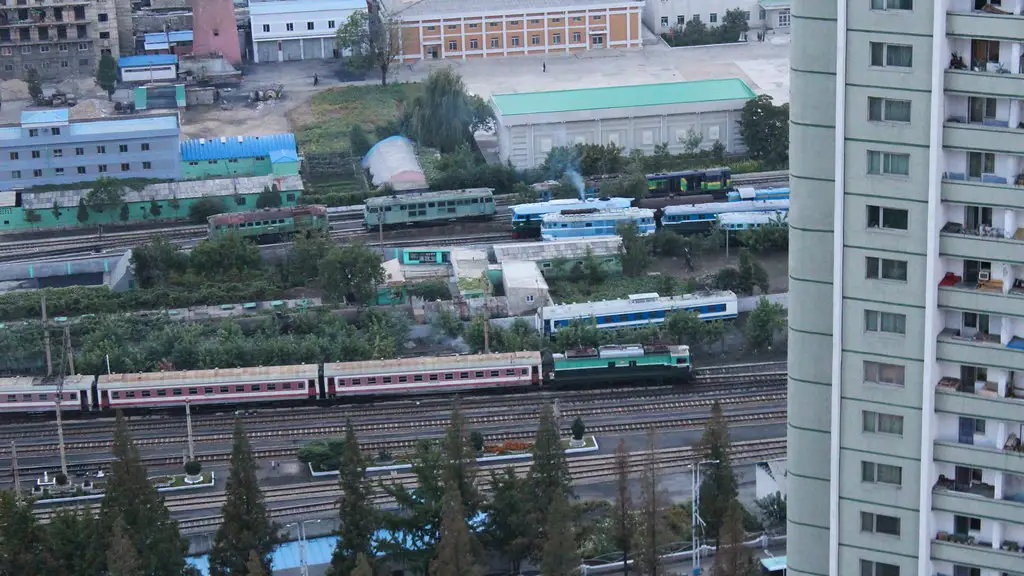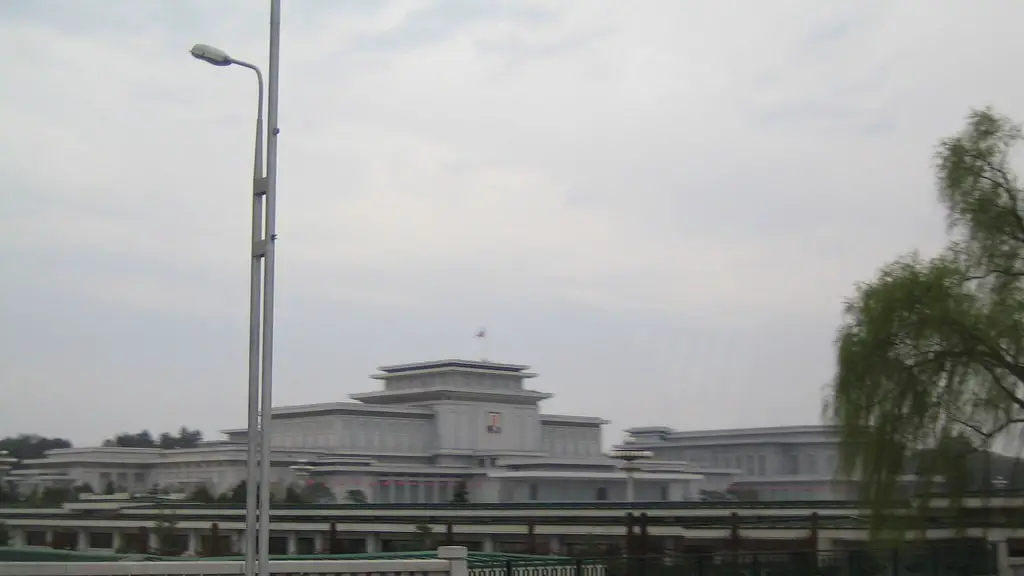Which Best Describes North Korea?
North Korea is one of the world’s most unique and isolated countries. It has been a continuous source of fascination for decades, with its mystery and mystique providing an alluring yet sometimes dangerous environment for exploration. From its closed nature, rapidly shifting relations with the West, and its nuclear ambitions, North Korea has been the focus of much international attention in recent years.
The official name of the state is the Democratic People’s Republic of Korea (DPRK), and it is one of the last surviving true communist countries in the world. A major part of their political philosophy is the so called policy of Juche, or “self-reliance”, which was introduced by the country’s founder, Kim Il-sung, in the 1950s. This policy is aimed at preserving the country’s independence from external influences, as well as promoting its own economic, social and cultural development.
North Korea also follows a totalitarian government structure. It is a one-party state dominated by a single ideology – the Juche ideology – and whose internal affairs are managed by the Worker’s Party of Korea. The government is in full control of the media and tightly monitors the activities of its people. This extreme form of governance has resulted in the implementation of numerous restrictions, such as preventing its citizens from having access to the internet and other forms of communication, and strictly regulating their movement.
The country is also known for its nuclear weapons program, which it has pursued since the late 1960s as a way to deter international military intervention and gain political leverage in the region. Although North Korea has been reluctant to fully abandon its program, it has made some progress in negotiations with the United States, most notably by participating in the Six Party Talks. However, the country has continued to develop its nuclear capabilities and continues to build up its stockpile of nuclear weapons.
North Korea’s human rights record is also a major concern for the international community. Reports of public executions, torture and other forms of human rights abuses against its own citizens are widely documented. Moreover, the government has control over most aspects of its citizens’ lives, from the type of music they can listen to, to the type of books they can read. This is a source of persistent violation of basic human rights.
In conclusion, North Korea is best described as an authoritarian, militaristic country with a highly secretive and nationalistic government. Its human rights record leaves much room for improvement, and its continued development of nuclear weapons leaves much of the world anxiously watching its every move. This is one of the most interesting and complex countries in the world, and it is certain to keep the world’s attention for years to come.
Geographic Aspects
North Korea is located in eastern Asia, in the northern part of the Korean Peninsula, which it shares with South Korea. It is roughly the size of Pennsylvania and is bordered by China, Russia, and South Korea. Its terrain is mostly mountainous, with many rivers and valleys cut out of the landscape by glaciers. The country’s highest peak is the Paektu Mountain, which rises to an elevation of 2,744 meters (9,003 ft), making it one of the tallest mountains in the Korean Peninsula. North Korea also boasts of a lengthy coastline, spanning more than 2000 kilometers (1,250 mi), which makes it particularly attractive for investors and tourists.
The country’s climate is predominantly continental, with hot summers and cold winters, making it difficult for many crops to grow. From a natural resource standpoint, the country is rich in coal, iron ore, zinc, and magnesite, with some titanium and uranium deposits. Additionally, North Korea is home to many rare species of wildlife, such as the Siberian tiger and the Korean goral.
Economy
The North Korean economy is largely state-controlled, with the government having control over most of the country’s transportation and communication infrastructure. This essentially means that the government is largely responsible for the production and distribution of most goods and services. The country does, however, have trade relations with many other countries, such as China and Russia.
The North Korean economy relies heavily on the exploitation of natural resources, with the extractive industry accounting for around 30% of its GDP. The country is also heavily dependent on foreign aid and investment, and receives substantial financial assistance from China, Japan, and the United States. Additionally, the North Korean government implements a heavily subsidized market system, where the government often sets prices lower than what could be achieved in an unregulated market.
The North Korean economy has long struggled with a steady decline in its GDP, due largely to the tightening of international sanctions and a lack of reforms. The country also suffers from extreme poverty and inequality, as wealth is concentrated among a small number of people. The country’s human development rankings remain among the lowest in the world, due to a lack of access to basic medical services, education, food, and other essential services.
Society and Culture
North Korea has traditionally been a highly stratified society. Its citizens are divided into three classes: the elite class, the middle class, and the lower class. The lower class, which includes most of the population, is generally underprivileged and unable to access the best resources available. Education is highly valued, and access to higher education is largely limited to the elite and privileged classes.
North Korean culture is heavily influenced by traditional and Confucian ethics, which emphasize loyalty, respect for authority, and the importance of maintaining one’s reputation. The country also has a strong nationalistic culture, which is reflected in its constitutional commitment to socialist ideals. This is also reflected in its citizens’ attitude towards foreign countries, which is often marked by mistrust and hostility.
North Korean citizens largely rely on the government for all their needs. The government provides heavily subsidized housing, food and medical services, and all citizens are strongly encouraged to take part in the state-led activities, such as promoting the government. Additionally, the government increasingly depends on citizens to report any suspicious activities that may be considered anti-government.
Military
The North Korean military is one of the largest in the world and is highly centralized, with the Supreme Leader being the de facto commander in chief. The military is divided into the regular Armed Forces and the reserve forces, comprised mostly of militia and paramilitary units. The Armed Forces are divided into the army, navy, air force, and strategic rocket forces, and are the primary defense forces of the country.
North Korea is in possession of an estimated 20 nuclear weapons, and the military is believed to possess a number of chemical and biological weapons. The military also serves to maintain domestic order, which it does largely through the extreme use of force and propaganda. Additionally, it is estimated that the North Korean military has a large number of personnel, totaling an estimated 1.2 million active personnel, making it one of the largest militaries in the world.
Foreign Relations
North Korea has a long and tumultuous relationship with the rest of the world, largely due to its nuclear ambitions and its idiosyncratic foreign policy. The country has traditionally been isolated from most countries, though it does maintain ties with its closest allies, China and Russia. Moreover, the country has been a source of tension in East Asia instability due to its provocative military activities and its refusal to participate in meaningful diplomatic efforts.
The country has traditionally been hostile towards the United States and South Korea. It has conducted numerous missile tests, some of which landed in Japan. In addition, the country often makes inflammatory statements against the US, and has threatened to target the US with nuclear weapons. It also maintains a close relationship with Iran over their shared distaste for Western powers, and is often referred to as the “hermit kingdom”.
North Korea has also been the recipient of numerous international sanctions. It is one of the countries subject to the United Nations Security Council sanctions, including an international arms embargo, limitations on its import and export of goods, and restrictions on its nuclear activities. These sanctions have severely hampered the country’s economic progress, and have had a profound effect on its citizens.





